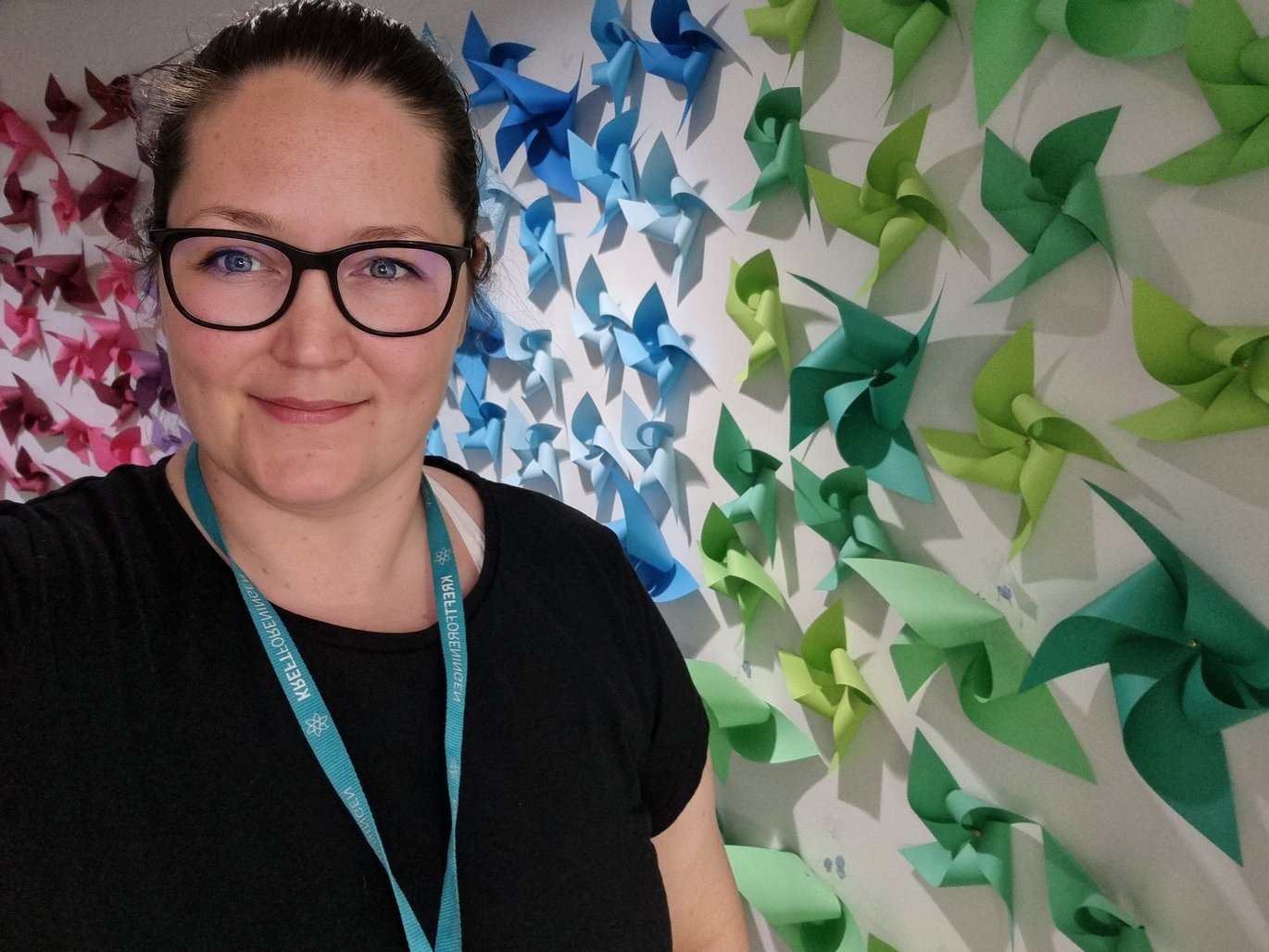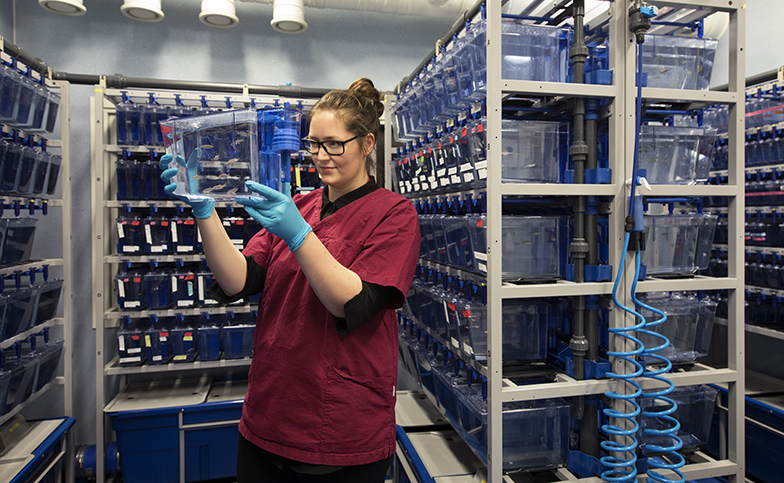A career dedicated to research support - from core facilities to research funding agencies
Where are they now? Meet NCMM alumna Rønnaug Steen Kolve and learn about her career path from studies in molecular medicine to managing first a core facility at an international research center and then research funding actions at the Norwegian Cancer Society.


Rønnaug Steen Kolve joined the Centre for Molecular Medicine Norway (NCMM) at the University of Oslo in 2015 and together with colleagues built the Zebrafish Core Facility, a research platform at the Faculty of Medicine. She ultimately became the manager of the facility. She then embarked on a career in research funding, first at the Norwegian Research Council, and currently at the Norwegian Cancer Society. I recently caught up with Rønnaug and learned about her career in academic research infrastructure and funding agencies.
How did you come to work in the Zebrafish Core Facility at the University of Oslo?
After finishing my Master's degree studies in Trondheim, I moved to Oslo to continue research. I had taken a course in behavioral and cognitive neuroscience, which I really enjoyed, and I had done some fish experiments during my Bachelor's studies. So working in a neuroscience lab helping to build a zebrafish facility was interesting to me. I was the first employee of the group and I was very much looking forward to the challenge!
When I started at the University of Oslo, I was in the Biotechnology Center which later merged with NCMM. I really liked the vision of these dynamic and active centers, as greenhouses for young, talented researchers. Even though I have since left academic research, I still have a special place in my heart for the young scientists and what they need in building their careers.
Tell me about your key accomplishments in the role of core facility manager.
When I started, there was no core service for zebrafish work at NCMM. Dr. Camila Esguerra, a group leader at NCMM, recruited me to help set up the facility. Just making this happen is a key accomplishment!
Setting up a core facility means putting together a lot of bits and pieces into an organized, well-functioning service and approved laboratory. I maintained the fish lines, monitored health, and managed the equipment. I also taught researchers at all levels, from Bachelor's, Master's, and PhD students to postdocs and senior scientists, in handling of the fish and using the equipment. Importantly, we needed proper approvals from Norwegian authorities in place at all times. This meant the initial set up as well as the inspections and renewals. It involved juggling many different tasks, and I'm very proud of what we accomplished and what the facility is able to offer.
What did you enjoy most about your time at NCMM?
It was challenging work, a steep learning curve - and I love learning. I figured out during my studies that being challenged regularly is really important for me. I get bored if I’m not actively learning. Camila, my colleagues at NCMM, and the visiting scientists had different skills and a lot of knowledge for me to pick up. This, along with the analytic work I did on my own, kept me motivated. In addition, I learned about Norwegian laws and regulations regarding keeping research animals and having a proper research lab. I also got to teach for the first time, which I enjoyed a lot!
I had little experience coming in, but I was trusted to do the tasks and do them quite independently, as well. This high level of trust gave me the space to succeed and the chance to grow. In science, you're often in a hurry to move on with critical experiments, and to learn at a quick pace. It can be exciting. But, some of the processes were lengthy, so I also had to learn and show patience and perseverance at the same time.
How did your time at NCMM help to shape your career path?
It’s not so often that you find people without a PhD running core facilities, so I know I might not be the typical case, but being a facility manager gave me the opportunity to show that I have many of the qualities a PhD in a similar role might have. This could have helped me secure the positions following, because it demonstrated that I have a high level of project management skills and a high capacity for learning in fast-paced work environments.
Also being in a renowned workplace and in partnership with EMBL - the Nordic EMBL Partnership - gave me strong backing.
From the practical skills side, insight into lab and project management, infrastructure, availability of resources, quality assessment, and so on certainly supported my career transition to research funding and dissemination agencies.
Tell me about the Norwegian Cancer Society and your role there.
The Norwegian Cancer Society is a large NGO in Norway dedicated to preventing and treating cancer, raising public awareness and improving quality of life for people with cancer and their families. The Norwegian Cancer Society raises funds for research funding, dissemination and political advocacy, patient and family support, collaboration with Norwegian health authorities, and communication and outreach.
Nearly 100% of the funding for the Norwegian Cancer Society work comes from donations. In addition to memberships and other income, we raise money through different campaigns like the yearly “Rosa sløyfe” and “Krafttak mot kreft” campaigns.
I'm responsible for our main call for applications, "Researcher Projects”. In this call, we have now gathered all of our former similar calls like “Open Call” and the “Rosa sløyfe call." This year it’s larger than ever with 186 MNOK - and that is all from donations. In a nutshell, my project management work entails running the application process, from writing and opening the call to finding the peer reviewers and managing the assessment process, and, after the board makes the final decision, contacting the grantees with the good news. It’s exciting because I see the whole process.
When I was working at the Research Council of Norway, they were organized a bit differently. The process is much larger, so I was more involved in some parts of the process than others. At the Norwegian Cancer Society, I get higher level insight to the whole process, which is one of the reasons why I took this job, together with being given the trust to manage this important process.
In addition to the main call, I am also going to arrange some events with scientific dissemination. The goal is for the public to meet the scientists and learn about their research first-hand. It’s about popular science and making research findings more accessible to the general public.
How do you find working in a funding agency? How is it like the academic research environment?
I'm not sure it's very similar, but as long as you're in a good environment where you are challenged and encouraged you will learn and develop your skills and career. From this perspective, we can find similarities.
We are working regularly with scientists, and we have a Scientific Council, who advises on our processes. We work with a very high level of integrity to ensure a solid process. This is similar to the research environment, where scientists ensure a high integrity of their experiments and analyses.
Transparency is also important. We try to be as open as possible about the funding process, recognizing that it’s not always easy to convey all of the information. This openness is also a similar mindset to good science.
For me personally, I find that analytical and problem-solving approaches are also similar. I always need to read up and know about what I need to do before I do it, do some analysis, crunch some numbers, look at what's happened previously. I like to see the data, e.g., our new system allows us to build up more data about the reviewers and the pile of applications from year to year. This helps me in the work of puzzling together the right competencies for the application review process.
Last, while the working environment may not be as international as in academic research, there is a lot of diversity of background in our organization. That means that we work collaboratively to find creative solutions and new approaches and to implement the actions that help us reach our goals all the way from fundraising to funding research. I wouldn't be able to do my job if I didn't have the good support from my colleagues.
If I only knew then what I know now…If you could give your younger self one piece of advice, what would it be?
I’d tell myself to have a bit more confidence and that it’s OK to be calm about the future. I always want to do my best. Working at the zebrafish facility was my first proper job after my studies, and I was a bit nervous. I needed to gain the confidence that things would work out if I just do solid work.
As I get older, I see that even if I fail, I learn from it. Just like in science. There’s no need to be afraid. You learn from challenges and life goes on. And, you can show your current or future employer that you learned something valuable. This is a mindset I like here at the Norwegian Cancer Society. It's about challenging yourself and trying new things. You don't have to be perfect the first time.
Brief career summary
Rønnaug Steen Kolve was initially trained in cell and molecular biology, earning a Bachelor’s degree in 2012 at the Norwegian University of Science and Technology (NTNU). She then continued studies and was awarded a Master’s degree in molecular medicine in 2014 at NTNU. In 2015, she joined the Biotechnology Center of Oslo, which was later merged with the Centre for Molecular Medicine Norway (NCMM) at the University of Oslo. There, she started as a lab manager and built the Zebrafish Core Facility, and formally became the core facility manager in 2017. After completing additional studies in pedagogy, she transitioned to a career in funding agencies, first working as an advisor at the Research Council of Norway. Since October 2021, she has been a special advisor at the Norwegian Cancer Society, working both in research funding and public outreach of science.
The “Where Are They Now? Nordic EMBL Partnership Alumni Careers” profiles introduce readers to alumni of the Nordic EMBL Partnership and the careers that they have embarked on.